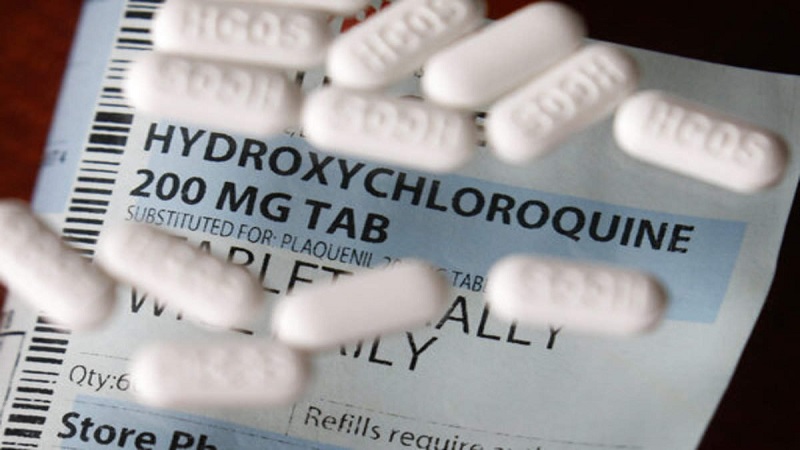 Image Courtesy:health.economictimes
Image Courtesy:health.economictimes
On Friday, the Ministry of Health and Family Welfare (MoHFW) issued a revised advisory on the use of Hydroxychloroquine (HCQ) as prophylaxis for Covid-19 infection. The the prophylactic use of HCQ is now recommended in the following categories:
1. All asymptomatic healthcare workers involved in containment and treatment of COVID19 and asymptomatic healthcare workers working in non-COVID hospitals/non-COVID areas of COVID hospitals/blocks
2. Asymptomatic frontline workers, such as surveillance workers deployed in containment zones and paramilitary/police personnel involved in COVID-19 related activities.
3. Asymptomatic household contacts of laboratory confirmed cases.
The move came after the Joint Monitoring Group under the chairmanship of the Director General of Health Services (DGHS), and including representatives from the All India Institute of Medical Sciences (AIIMS), Indian Council of Medical Research (ICMR), National Center for Disease Control (NCDC), National Disaster Management Authority (NDMA), World Health Organisation (WHO) and experts drawn from Central Government hospitals reviewed the prophylactic use of Hydroxychloroquine (HCQ) in the context of expanding it to healthcare and other front line workers deployed in non-Covid and Covid areas, respectively.
According to the revised advisory, “At National Institute of Virology (NIV), Pune, the report of the in-vitro testing of HCQ for antiviral efficacy showed reduction of infectivity /log reduction in viral RNA copy of SARs-CoV2.” Additionally, “A retrospective case-control analysis at ICMR has found that there is a significant dose-response relationship between the number of prophylactic doses taken and frequency of occurrence of SARSCoV-2 infection in symptomatic healthcare workers who were tested for SARS-CoV-2 infection.”
The advisory also sites other studies conducted at hospitals in New Delhi. It says, “Another investigation from 3 central government hospitals in New Delhi indicates that amongst healthcare workers involved in COVID-19 care, those on HCQ prophylaxis were less likely to develop SARS-CoV-2 infection, compared to those who were not on it. The benefit was less pronounced in healthcare workers caring for a general patient population.”
As per another study mentioned in the advisory, “An observational prospective study of 334 healthcare workers at AIIMS, out of which 248 took HCQ prophylaxis (median 6 weeks of follow up) in New Delhi also showed that those taking HCQ prophylaxis had lower incidence of SARS-CoV-2 infection than those not taking it.”
However, this is advisory also warns that “It is reiterated that the intake of above medicine should not instil a sense of false security.”
This is critical in wake of several questions being raised about the efficacy of HCQ. According to a recent study published in The Lancet, a highly respected peer-reviewed medical journal, “Hydroxychloroquine or chloroquine, often in combination with a second-generation macrolide, are being widely used for treatment of COVID-19, despite no conclusive evidence of their benefit. Although generally safe when used for approved indications such as autoimmune disease or malaria, the safety and benefit of these treatment regimens are poorly evaluated in COVID-19.”
The methodology of the study by Mandeep R Mehra, Sapan S Desai, Frank Ruschitzka and Amit N Patel is explained as follows:
“We did a multinational registry analysis of the use of hydroxychloroquine or chloroquine with or without a macrolide for treatment of COVID-19. The registry comprised data from 671 hospitals in six continents. We included patients hospitalised between Dec 20, 2019, and April 14, 2020, with a positive laboratory finding for SARS-CoV-2. Patients who received one of the treatments of interest within 48 h of diagnosis were included in one of four treatment groups (chloroquine alone, chloroquine with a macrolide, hydroxychloroquine alone, or hydroxychloroquine with a macrolide), and patients who received none of these treatments formed the control group. Patients for whom one of the treatments of interest was initiated more than 48 h after diagnosis or while they were on mechanical ventilation, as well as patients who received remdesivir, were excluded. The main outcomes of interest were in-hospital mortality and the occurrence of de-novo ventricular arrhythmias (non-sustained or sustained ventricular tachycardia or ventricular fibrillation).”
Here are their key findings:
96 032 patients (mean age 53·8 years, 46·3% women) with COVID-19 were hospitalised during the study period and met the inclusion criteria. Of these, 14 888 patients were in the treatment groups (1868 received chloroquine, 3783 received chloroquine with a macrolide, 3016 received hydroxychloroquine, and 6221 received hydroxychloroquine with a macrolide) and 81 144 patients were in the control group. 10 698 (11·1%) patients died in hospital.
After controlling for multiple confounding factors (age, sex, race or ethnicity, body-mass index, underlying cardiovascular disease and its risk factors, diabetes, underlying lung disease, smoking, immunosuppressed condition, and baseline disease severity), when compared with mortality in the control group (9·3%), hydroxychloroquine (18·0%; hazard ratio 1·335, 95% CI 1·223–1·457), hydroxychloroquine with a macrolide (23·8%; 1·447, 1·368–1·531), chloroquine (16·4%; 1·365, 1·218–1·531), and chloroquine with a macrolide (22·2%; 1·368, 1·273–1·469) were each independently associated with an increased risk of in-hospital mortality.
Compared with the control group (0·3%), hydroxychloroquine (6·1%; 2·369, 1·935–2·900), hydroxychloroquine with a macrolide (8·1%; 5·106, 4·106–5·983), chloroquine (4·3%; 3·561, 2·760–4·596), and chloroquine with a macrolide (6·5%; 4·011, 3·344–4·812) were independently associated with an increased risk of de-novo ventricular arrhythmia during hospitalisation.
The study therefor concluded, “We were unable to confirm a benefit of hydroxychloroquine or chloroquine, when used alone or with a macrolide, on in-hospital outcomes for COVID-19. Each of these drug regimens was associated with decreased in-hospital survival and an increased frequency of ventricular arrhythmias when used for treatment of COVID-19.”
The entire study may be read here:
The Health Ministry’s latest revised advisory may be viewed here
Related: